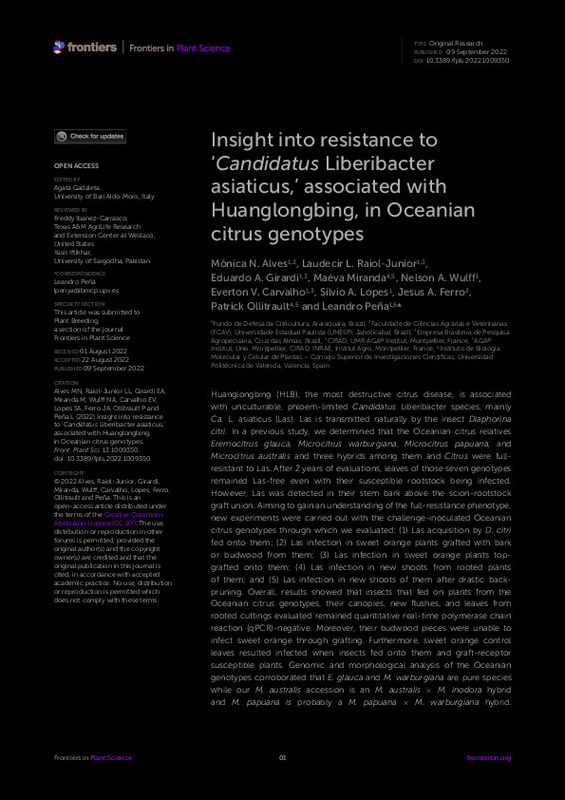JavaScript is disabled for your browser. Some features of this site may not work without it.
Buscar en RiuNet
Listar
Mi cuenta
Estadísticas
Ayuda RiuNet
Admin. UPV
Insight into resistance to 'Candidatus Liberibacter asiaticus,' associated with Huanglongbing, in Oceanian citrus genotypes
Mostrar el registro sencillo del ítem
Ficheros en el ítem
| dc.contributor.author | Alves, Monica N.
|
es_ES |
| dc.contributor.author | Raiol-Junior, Laudecir L.
|
es_ES |
| dc.contributor.author | Girardi, Eduardo A.
|
es_ES |
| dc.contributor.author | Miranda, Maéva
|
es_ES |
| dc.contributor.author | Wulff, Nelson A.
|
es_ES |
| dc.contributor.author | Carvalho, Everton V.
|
es_ES |
| dc.contributor.author | Lopes, Silvio A.
|
es_ES |
| dc.contributor.author | Ferro, Jesus A.
|
es_ES |
| dc.contributor.author | Ollitrault, Patrick
|
es_ES |
| dc.contributor.author | Peña, L
|
es_ES |
| dc.date.accessioned | 2024-04-11T07:38:08Z | |
| dc.date.available | 2024-04-11T07:38:08Z | |
| dc.date.issued | 2022-09-09 | es_ES |
| dc.identifier.uri | http://hdl.handle.net/10251/203312 | |
| dc.description.abstract | [EN] Huanglongbing (HLB), the most destructive citrus disease, is associated with unculturable, phloem-limited Candidatus Liberibacter species, mainly Ca. L. asiaticus (Las). Las is transmitted naturally by the insect Diaphorina citri. In a previous study, we determined that the Oceanian citrus relatives Eremocitrus glauca, Microcitrus warburgiana, Microcitrus papuana, and Microcitrus australis and three hybrids among them and Citrus were full-resistant to Las. After 2 years of evaluations, leaves of those seven genotypes remained Las-free even with their susceptible rootstock being infected. However, Las was detected in their stem bark above the scion-rootstock graft union. Aiming to gain an understanding of the full-resistance phenotype, new experiments were carried out with the challenge-inoculated Oceanian citrus genotypes through which we evaluated: (1) Las acquisition by D. citri fed onto them; (2) Las infection in sweet orange plants grafted with bark or budwood from them; (3) Las infection in sweet orange plants top-grafted onto them; (4) Las infection in new shoots from rooted plants of them; and (5) Las infection in new shoots of them after drastic back-pruning. Overall, results showed that insects that fed on plants from the Oceanian citrus genotypes, their canopies, new flushes, and leaves from rooted cuttings evaluated remained quantitative real-time polymerase chain reaction (qPCR)-negative. Moreover, their budwood pieces were unable to infect sweet orange through grafting. Furthermore, sweet orange control leaves resulted infected when insects fed onto them and graft-receptor susceptible plants. Genomic and morphological analysis of the Oceanian genotypes corroborated that E. glauca and M. warburgiana are pure species while our M. australis accession is an M. australis x M. inodora hybrid and M. papuana is probably a M. papuana x M. warburgiana hybrid. E. glauca x C. sinensis hybrid was found coming from a cross between E. glauca and mandarin or tangor. Eremocitrus x Microcitrus hybrid is a complex admixture of M. australasica, M. australis, and E. glauca while the last hybrid is an M. australasica x M. australis admixture. Confirmation of consistent full resistance in these genotypes with proper validation of their genomic parentages is essential to map properly genomic regions for breeding programs aimed to generate new Citrus-like cultivars yielding immunity to HLB. | es_ES |
| dc.language | Inglés | es_ES |
| dc.publisher | Frontiers Media SA | es_ES |
| dc.relation.ispartof | Frontiers in Plant Science | es_ES |
| dc.rights | Reconocimiento (by) | es_ES |
| dc.subject | Greening | es_ES |
| dc.subject | HLB | es_ES |
| dc.subject | Rutaceae | es_ES |
| dc.subject | Aurantioideae | es_ES |
| dc.subject | Microcitrus | es_ES |
| dc.subject | Eremocitrus | es_ES |
| dc.subject | Citrus breeding | es_ES |
| dc.title | Insight into resistance to 'Candidatus Liberibacter asiaticus,' associated with Huanglongbing, in Oceanian citrus genotypes | es_ES |
| dc.type | Artículo | es_ES |
| dc.identifier.doi | 10.3389/fpls.2022.1009350 | es_ES |
| dc.rights.accessRights | Abierto | es_ES |
| dc.description.bibliographicCitation | Alves, MN.; Raiol-Junior, LL.; Girardi, EA.; Miranda, M.; Wulff, NA.; Carvalho, EV.; Lopes, SA.... (2022). Insight into resistance to 'Candidatus Liberibacter asiaticus,' associated with Huanglongbing, in Oceanian citrus genotypes. Frontiers in Plant Science. 13:1-23. https://doi.org/10.3389/fpls.2022.1009350 | es_ES |
| dc.description.accrualMethod | S | es_ES |
| dc.relation.publisherversion | https://doi.org/10.3389/fpls.2022.1009350 | es_ES |
| dc.description.upvformatpinicio | 1 | es_ES |
| dc.description.upvformatpfin | 23 | es_ES |
| dc.type.version | info:eu-repo/semantics/publishedVersion | es_ES |
| dc.description.volume | 13 | es_ES |
| dc.identifier.eissn | 1664-462X | es_ES |
| dc.identifier.pmid | 36160987 | es_ES |
| dc.identifier.pmcid | PMC9500433 | es_ES |
| dc.relation.pasarela | S\486992 | es_ES |








